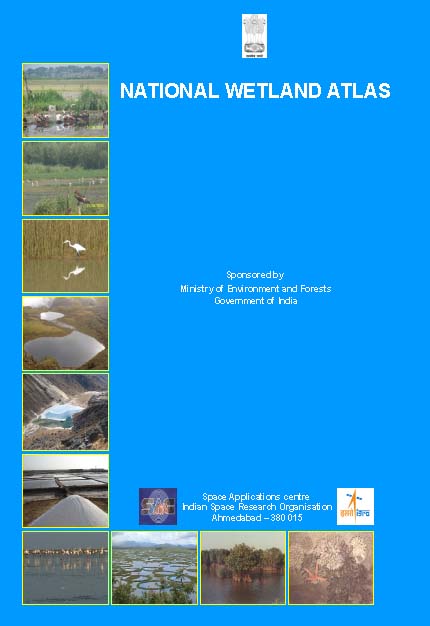India
Environmental impact assessment - Notification and amendment (2006) - Ministry of Environment and Forests
Posted on 18 Jun, 2011 10:01 PMThe document emphasises the need for taking prior environmental clearance in case of new projects or activities or expansion of already existing activities in accordance with the objectives of National Environment Policy that has approved by the Union Cabinet on 18th May, 2006 and the procedure specified in the notification, by the Central Government or the State or Union territory Level.
Presentations from the two-day workshop on success stories under watershed programmes by DoLR at New Delhi (2011)
Posted on 18 Jun, 2011 06:50 PMThe workshop was structured in two sections. Research papers were presented from research institutes such as Central Research Institute for Dryland Agriculture (CRIDA), Central Soil & Water Conservation Research and Training Institute (CSWRTI), Deutsche Gesellschaft für Internationale Zusammenarbeit (GIZ) GmbH, International Crops Research Institute for the Semi-Arid Tropics (ICRISAT), National Research Centre for Agroforestry (NRCAF), National Institute for Rural Development (NIRD) and National Bank for Agriculture and Rural Development (NABARD). This was followed by presentation of success stories by various States.
Consultation meeting with Panchayati Raj Institution representatives on review of the National Water Policy
Posted on 18 Jun, 2011 12:43 PMShri Salman Khurshid, Minister of Water Resources, inaugurated the first Consultation Meeting with the representatives of Panchayati Raj Institutions from the States of Andhra Pradesh, Kerala, Puducherry, Lakshadweep, Tamil Nadu and Karnataka on review of the National Water Policy at Water and Land Management Training and Research Institute (WALAMTARI), Hyderabad. Speaking on the occasion he said that our National Water Policy should be truly a National Policywith full participation of all throughout the country. He called upon the elected representatives of the Panchayati Raj Institutions to provide specific feedback on the centre’s role in water management from conflict resolution to co-operative development and on the ownership issue of groundwater. Shri Vincent H. Pala, Minister of State for Water Resources, briefed the elected representatives of Panchayati Raj Institutions about the consultation process undertaken by the Ministry of Water Resources for review of National Water Policy.
"Climate change" - Understanding the connections with energy use, and how India's galloping economic growth and insatiable appetite for energy can be balanced with environmental security?
Posted on 18 Jun, 2011 12:52 AM
Introduction: Energy versus emissions: The big challenge of the new millennium
By Rakesh Kalshian
To maintain its economic growth rate of 8-10%, India needs all the energy it can get. But the momentum of economic growth overrides crucial environmental concerns.
Hotting up: The science and politics of climate change
By Aditi Sen
The world is hotting up. Climate systems are changing. The 1990s were the hottest decade ever, sea levels rose by 10-20 cm during the 20th century, and atmospheric carbon dioxide levels are 31% higher than in 1750.
"Battles over land" - Land as commodity and land for livelihoods - Special issue from Infochange
Posted on 18 Jun, 2011 12:48 AMWhat are the laws governing acquisition? What is the social impact of a development-at-all-costs policy? Can those who owned and lived off the land have a stake in its development?
National Wetland Atlas – An updated database of wetlands in India by the Ministry of Environment and Forests (2011)
Posted on 17 Jun, 2011 02:44 PM This book by Space Applications Centre (SAC), Indian Space Research Organisation (ISRO) is an outcome of the project on National Wetland Inventory and Assessment (NWIA) . Increasing concern about how our wetlands are being influenced had led to formulation of the project entitled to create an updated database of the wetlands of India.
This book by Space Applications Centre (SAC), Indian Space Research Organisation (ISRO) is an outcome of the project on National Wetland Inventory and Assessment (NWIA) . Increasing concern about how our wetlands are being influenced had led to formulation of the project entitled to create an updated database of the wetlands of India.
Wetlands defined as areas of land that are either temporarily or permanently covered by water exhibit enormous diversity according to their genesis, geographical location, water regime and chemistry. They are one of the most productive ecosystems and play crucial role in hydrological cycle. Utility-wise, wetlands directly and indirectly support millions of people in providing services such as storm and flood control, clean water supply, food, fiber and raw materials, scenic beauty, educational and recreational benefits. Thus, their identification and protection becomes very important.
Pradan is looking for Monitoring and Evaluation consultant at New Delhi
Posted on 17 Jun, 2011 12:20 PMPradan is an NGO that works with poor and marginalized communities across central/eastern India. We are presently working with over 200,000 families to reduce poverty through enhancing assets/capabilities and facilitating access to sustainable income earning opportunities.
Annual Jamnalal Bajaj Foundation awards in four different categories
Posted on 17 Jun, 2011 12:00 PMEstablished in 1977 in the memory of Jamnalal Bajaj, a close associate of Mahatma Gandhi, the Foundation strives to serve the ideals to which Jamnalal Bajaj had dedicated his life and promotes the kind of Gandhian constructive activities in which he himself was deeply involved during his life-time.
Apeejay Surrendra Group launches 'Apeejay India Volunteer Awards 2011'
Posted on 17 Jun, 2011 11:43 AMApeejay Surrendra Group in association with i-Volunteer and International Business Leaders Forum, UK (IBLF) has announced the commencement of the Apeejay India Volunteer Awards 2011 (AIVA), an annual national recognition focused on rewarding work of volunteers and volunteer engaging corporate and NGOs. AIVA aims to identify champions in volunteering in India, recognize volunteers and organizations engaged in volunteering, raise awareness around volunteering, celebrate and promote this much needed effort and drive volunteering as a mainstream interest in Indians.
Women at the center of climate friendly approaches to agriculture and water use - A report by the Institute for Agriculture and Trade Policy
Posted on 17 Jun, 2011 10:45 AM The Institute for Agriculture and Trade Policy draws on the experiences of the Tamilnadu Women’s Collective (WC), a state-level federation of women’s groups from 1,500 villages, in the context where communities all around the world are struggling to find ways to cope with changes affecting food and water security because of the phenomenon of climate change.
The report argues that many a times, new food and water security policies at the national and international level tend to be narrow, look at each of these issues in isolation and undermine food and water security strategies adopted by individuals and households from marginal groups. Adaptation strategies to address food security focus almost exclusively on increasing agricultural production, while ignoring health and cultural aspects of the food being produced, and the role of agriculture as a means for rural viability.